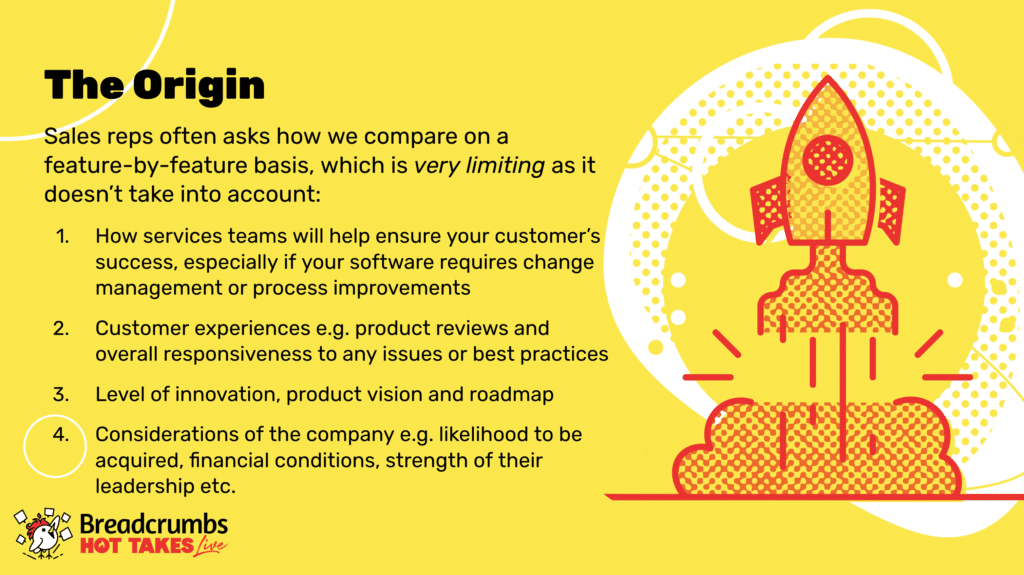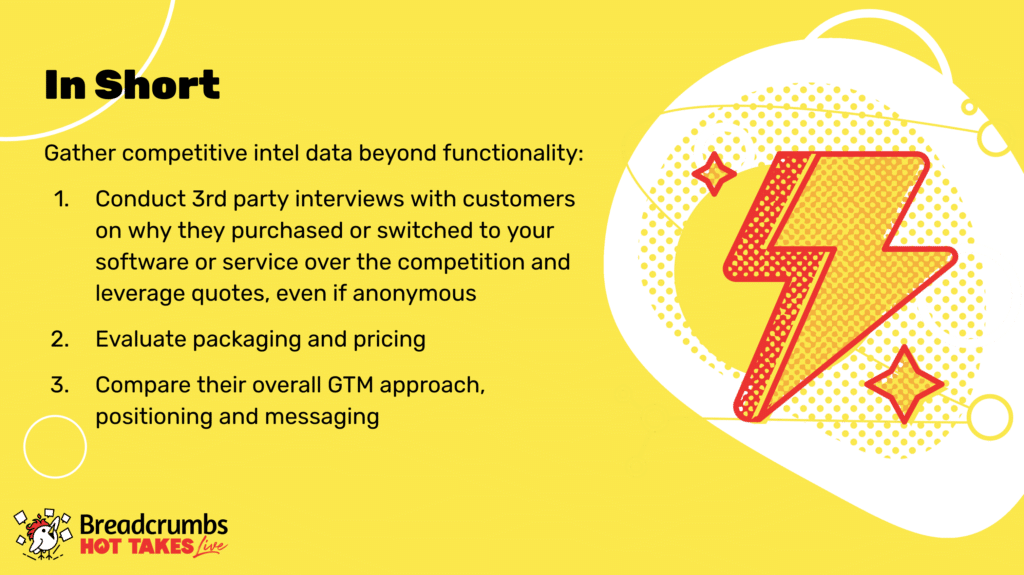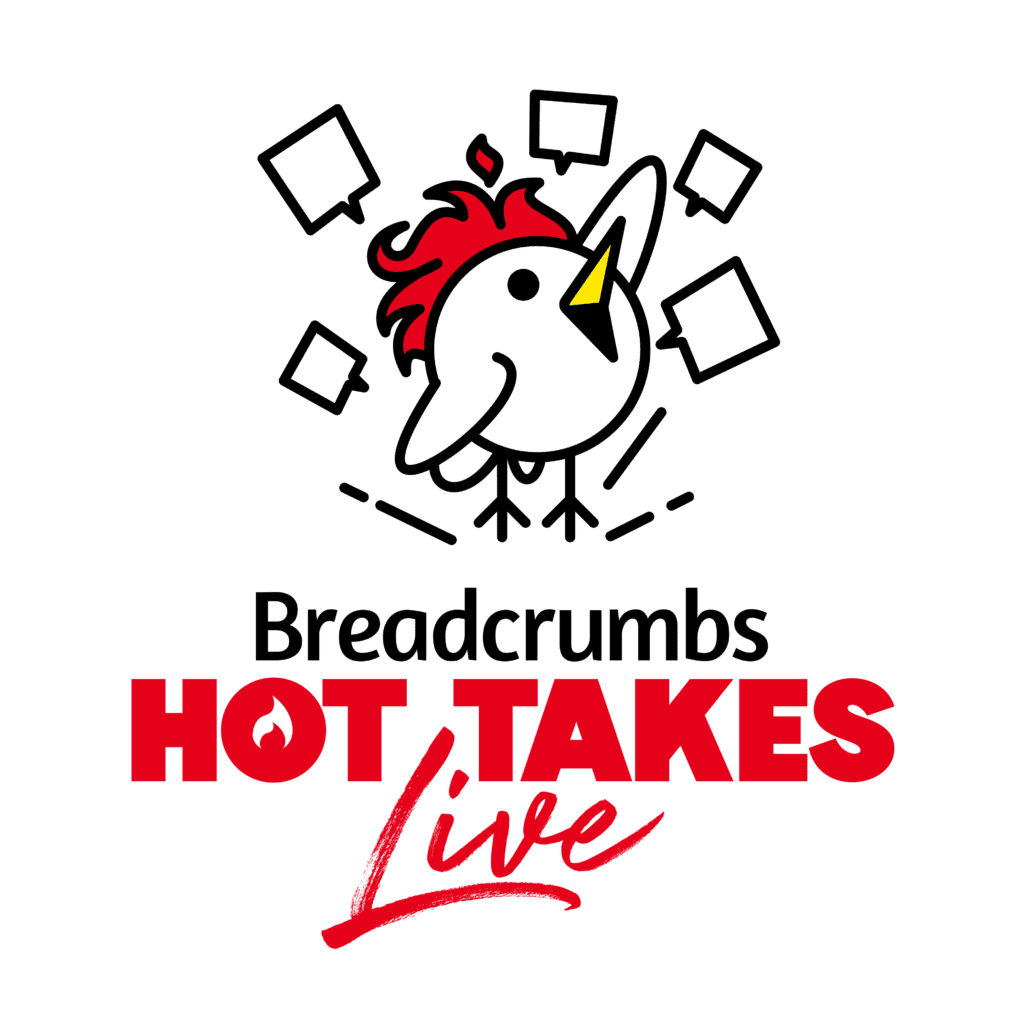Trying to compare your product to a competitor is not always a feature-by-feature comparison. In fact, that could get you in hot water if it’s inaccurate. You must also analyze their services, sales, and other areas that are critical for the software implementation to be successful.
In this session with Amy Beaudoin, Product Marketing Director at Visier, you will learn:
- Ways to compete beyond talking about features
- How to demonstrate weaknesses in your competitor through a third party
- Points to give your sellers to win the deal
[Transcript] Competitive Intelligence is not a Feature Comparison
Although transcriptions are generally very accurate, just a friendly reminder that they could sometimes be incomplete or contain errors due to unclear audio or transcription inaccuracies.
Gary Amaral
Good things are worth waiting for, and this is a good thing. So, we are lucky enough to be joined by Amy Beaudoin from Visier, a product marketing director, and she’s going to be telling us why competitive intel is not a feature-by-feature comparison. Super psyched for the topic. Amy, feel free to take it away.
Amy Beaudoin
Sounds good. Thanks for that great introduction, Gary. Just a little bit about me. I actually just joined Visier recently. I’m super excited. We’re a people analytics solution. In my last role, I had the awesome opportunity to meet and do a webinar with one of my heroes, April Dunford, who is really one of the best product marketers out there. She’s written a book, obviously awesome, which really helps a lot with positioning and messaging.
The background for this is that a lot of times, with sales teams, they will often say, “I’m going against this competitor, and I’m having an issue because I don’t know how deep into this particular functionality that we’ve got.” But oftentimes, that can be limiting, and sometimes you can’t compete at all.

You want to make sure, of course, that you’ve got MVP for the market, that you corner off a lot of the use cases that are out there. But it’s very difficult if you’re trying to go feature by feature because oftentimes you don’t have that information. You can look on their support site to try to get a sense of it.
In some cases, you can get a demo of the actual product. But sometimes, again, you’re not going to be keeping up with what’s going on in terms of their innovation. So, you can actually provide false information, which would really reduce your sales team’s reputation in the market.
Functionality is still important, but it is also good to talk about other things. One of the things I’m coming across a lot, particularly in my last role, we had change management software that required process improvement.
The services component was really important. We had over 10 years of experience to help walk people through each phase of that cycle. We had lots of documents supporting that, we had things in our university that really walked customers through, so it was a huge difference from our competitors.
In our win-loss program, a lot of the quotes that we got, we would anonymize them but we would also talk about that particular services piece. I remember one of the customers was even talking about the fact that our competitor was quite combative and really inflexible. So again, you want to highlight those things if you’re going against a competitor that has those issues.
Next would be the overall customer experiences. Product review sites are good to take a look at that. But even like app responsiveness, if there’s a DAM or something that’s going to be sucking up a lot of bandwidth with the application, and yours doesn’t have that, you want to highlight the fact that you’re able to answer questions and produce a lot faster than your competitors.
If you’re providing any best practices, maybe there’s a maturity model that you have, and you’re moving customers along that level of sophistication, and your competitor doesn’t have that; that’s another area that you want to highlight to really stand out.
I’ve also got here level of innovation, product vision, and roadmap. We want to sell a lot of our customers on where we’re going. They’re not just buying us for the here and now, but they want to make sure that we’re going to continuously innovate and keep up with the market demands and needs of the market.
So, it’s very important that you have your customers buy into that. But you can also bring that up as a differentiator, in particular, if you’re not seeing that from a competitor. Sometimes, competitors will actually post what’s coming on their website. You can get that, but it’s often difficult to find out that information.
Another consideration can just be in terms of the company itself. How viable is the organization? Are they looking at possibly being acquired? So, is there going to be a lot of disruption at that organization where it might be difficult to get help, etc., during a period of time?
In some cases, you will find out about these things, you know, there’s potential for that. Then also any financial conditions. Again, if they’re going through any uncertainty at all, the strength of their leadership. You can look at Glassdoor and different things to see how well their CEO is liked.
Again, just use some other ways of really bringing this out. A lot of times, what I would do is I’ll have questions to ask that I’ll put in the battle card, and that will sort of uncover, to your buyer, some of the issues again that might be being faced with a competitor that they’re talking to.
One of the things that was really odd too, when I was doing some research, we hired a company that would go in and speak to our competitor directly. And we found out that the actual sales process itself was extremely arduous. You had to go through two separate paths before you would actually even get to a quote.
They would finally combine everything at the quote. We had two separate demos if you wanted, let’s say, two aspects of their solution. So that’s also important. You can talk about that as well. Again, how great the sales experience is going to be, all the experiences along the customer journey are really, really important. So I just wanted to bring that up.
Another one could be the implementation cycle, the time to value, and highlighting how important it is. So again, these angles have worked in the past, so that’s why I’ve kind of highlighted these ones in particular.

So really, if you’re going to get competitive intelligence data beyond just the functionality, again you can go to product review sites to get that. You can look at their support sites to try to get that information.
Again, if you’ve got a demo environment, great, and you can take a look and see what they have. But I find it really helpful to conduct third-party interviews with customers on why they purchased or why they switched.
We were using a company called Iceberg IQ. And so that really helped us because it’s a third party. You just basically give them a brief with some of the main things that you want to find out from your customers, and really they can tell you about not just the software, but the overall experience they had all the way to buying and then really post-purchase. And you want to leverage their quotes.
We had another situation where we had a previous customer that went to another organization, and they really wanted to use a competitor software. We were able to go back in and take these quotes again and show them: this is why it’s problematic to consider that for your organization, and it helped her kind of solidify with the rest of the buyers on the committee as to why our solution was the better choice.
Again, you can evaluate packaging and pricing. So as packaging and pricing, you can look at their website again or do some sort of interview behind the scenes and find out how they’re structuring that because a lot of times, what I also found out is that we had a competitor that was going with five licenses out of the gate.
So it was like a land-and-expand kind of strategy, but it made our pricing look more expensive. So, just how they approach that through the sales process but then also how they actually have priced their product is important. And their overall go-to-market approach and positioning and messaging.
So again, we look at verticals. You know, how are they positioned in the market? That’s kind of back to even what their mission is and where they plan to go. Analyst reports are really helpful for this also because a lot of times, if you look at something like a Forrester Wave report for example, you can see how the analysts have actually evaluated them. Do they buy into their vision?
Often, there are quotes in there. We’ve leveraged our quotes because, in one case, we did really well, so anything on the vision was also included in any kind of pitch deck.
So, in practice, you want to make sure that your battle cards really call out the ways that your organization ensures the ongoing success of your customers. Obviously, have quotes or anything like that along those lines, especially if they’re overly wowed about the experience they’ve had.

Because oftentimes, a lot of software companies are not, so it’s really important. In my past role, I was lucky that they were extremely happy with all the support that they had, constantly in ongoing training, etc. So, we would pull those quotes out and make sure that sales had that for pitch decks, as I mentioned.
Really talk about why you’re a category leader, if that’s applicable. If you’re in the Gartner Magic Quadrant, you’re a leader. Why did you get evaluated to be a leader?
So you want to highlight those things. The overall user experience. If your software even has any persona-specific experiences, so you might have, for one of your users, say if it was a marketer, you have a marketer experience.
You might have a marketing ops experience, you might have a marketing finance experience. Just giving some examples here, but you know, you can talk about the fact that you actually have something very unique. Again, that could be a differentiator, and you want to call those out in your battle card and make sure that your competitors don’t have that.
Then, really include questions that highlight the weakness. So again, if it’s a difficult sales process or they don’t really do a lot in your existing marketing vertical or segment, you want to make sure that you include those as well.
Then, any technical considerations, as I said, like app responsiveness, ease of use, depth of integrations. That came up again with another of our competitors; they were primarily focused on the SMB market, and we were mid-market and enterprise.
We found out that in a lot of cases, one customer quoted saying, “Their integrations were like on training wheels.” They didn’t have the connectors set up to be able to pull in the data to be able to give that complete picture.
They were surprised because they just assumed it would be the same as what they had with us. They actually were a customer that switched and then switched back to using us, but that’s really important as well.
Then, another source is, of course, interviewing customers as much as you can, especially if they switched. Or if there was a competitor in the deal cycle, you want to make sure that you talk to them and find out why because those are more believable than anything.
Really, I think–as a key takeaway. Competitive intelligence is really knowing how good your business is versus the competition.
As I said, it’s not down to this functionality feature-by-feature comparison but really understanding that you are the leader in the market and convincing your customers of that through these other ways of talking about the full experience that they’re going to have with you. And then have those quotes and customer references to back it up.
So that is the conclusion of my presentation. I’ll open it up to any questions that you have.

Hot Takes Live
Replays
Catch the replay of Hot Takes Live, where 30 of the top SaaS leaders across Marketing, Sales, and RevOps revealed some of their most unpopular opinions about their niche.
These leaders shared what lessons they learned and how they disrupted their industry by going against the grain (and achieved better results in the process).
Gary Amaral
Awesome, Amy, thank you so much. Really appreciate that. We only have about a minute for questions, but that’s okay. Before we get into a question, if people want to continue this conversation, if they want to learn more about how you think about this, what’s the best way for them to get in touch with you?
Amy Beaudoin
Yeah, just hit me up on LinkedIn. So it’s just Amy Beaudoin, and you’ll find me. I think it still actually has my old company. I have; I do have to update it this week because I literally just started.
Gary Amaral
Obviously, if they just google Visier, they’ll find Visier, and they can learn more that way.
So, quick question: I agree with you, competitive intelligence is way more than a feature-by-feature comparison. The richer the story around what you’re solving, the better. We cannot get away from those side-by-side feature checklists though, right?
Is that, like, how do you fight that? How do we encourage sales not to lean on that so heavily? How do we keep it off of our websites, or should we even?
Amy Beaudoin
Yeah, I found when I’ve done outtake campaigns where you’re doing a feature-by-feature, you know, a side-by-side comparison, I try not to lean into the feature stuff as much. You know, the only thing that you can do, I would probably say, for the feature side is to highlight the ones that are really, really critical and to show how your software is better. Because even when it comes to functionality, it’s the depth of that functionality that’s important.
If you actually win on that, then you want to highlight that. But I would definitely say, back to the use cases as I mentioned at the very beginning, if you’re solving for the key use cases in the market and you can show that this functionality you have does that and does it better, sure. You can show that.
Like what I’ve done in the past is, I won’t just have like the little checkmarks and stuff and the X’s, I would actually put within the actual box, why? Like a little bit about why it’s better. I mean, maybe it’s really high-powered or whatever, right? So you’ve taken this functionality to the next level. So you can show it, you can show it that way.
But when it comes to, you know, if you’re doing an outtake campaign as I say, for SEO optimization, I would definitely, you know, try to encourage you to put more things around third-party stuff.
Like again, if you’ve got a Forrester Wave and you’re more of a leader, and they’re not, those are the types of things that you want to do a side-by-side comparison because it’s a very hard battle to win sometimes because the opposite will be said of you from your competitor
Gary Amaral
100%. Awesome, Amy, thank you so much for that. Really appreciate you joining us.
Amy Beaudoin
It was a pleasure to be here. Bye.
